Italian postcard by Rotalcolor, no. 1.
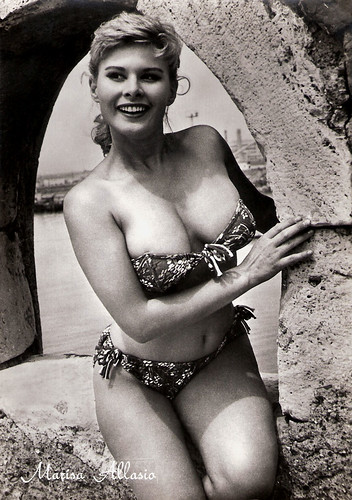
Italian postcard by Rotalfoto, no. 714.

Italian postcard by Rotalfoto, no. R. 107.
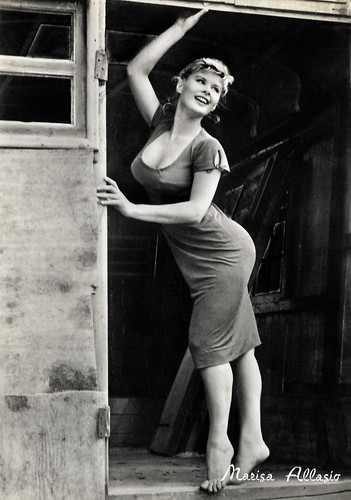
Italian postcard by S.A. Poligrafica Sammerinese, no. 019-d.
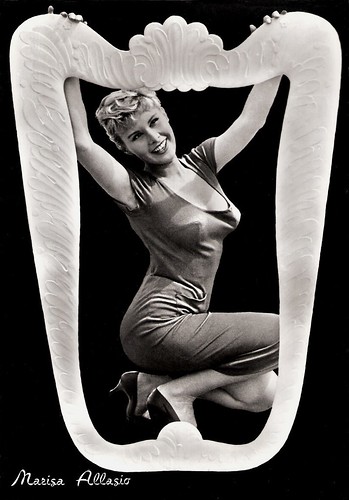
Italian postcard by SA Poligrafica Sammarinese, no. 020-d.
German postcard by Universum-Film Aktiengesellschaft (UFA), Berlin-Tempelhof, no. CK-174. Retail price: 30 Pfg. Photo: G.B. Poletto / UFA.
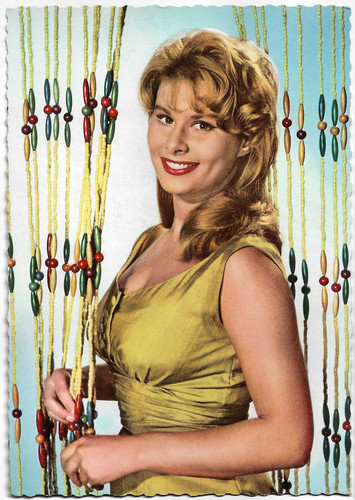
West German postcard by Universum-Film Aktiengesellschaft (UFA), Berlin-Tempelhof, no. CK-236. Photo: Klaus Collignon.
Miss Lido
Marisa Allasio was born Maria Luisa Lucia Allasio in Turin in 1936. She was the daughter of Federico Allasio, road contractor, goalkeeper of the Torino soccer team and coach of many Italian soccer teams, and his wife Lucia Rocchietti.
At 14, she was crowned Miss Lido, winning her first and only beauty contest. When Italian magazines published the pin-up art of 'Miss Lido,' she was transferred to a public school.
At 16, Marisa made her film debut in a bit part in the melodrama Perdonami!/Forgive me (Mario Costa, 1952) starring Raf Vallone and Antonella Lualdi. She talked her parents into enrolling her in Rome’s Academy of Dramatic Arts.
In the following years, she appeared in Italian film productions like the soccer film Gli eroi della domenica/The Sunday Heroes (Mario Camerini, 1953) starring Raf Vallone and Marcello Mastroianni, Cuore di mamma/Mother's Heart (Luigi Capuano, 1954), and Ragazze d'oggi/Girls of Today (Luigi Zampa, 1955).
She also had an uncredited part in the international epic War and Peace (King Vidor, 1956) based on the famous novel by Leo Tolstoy and starring Audrey Hepburn, Henry Fonda and Mel Ferrer.
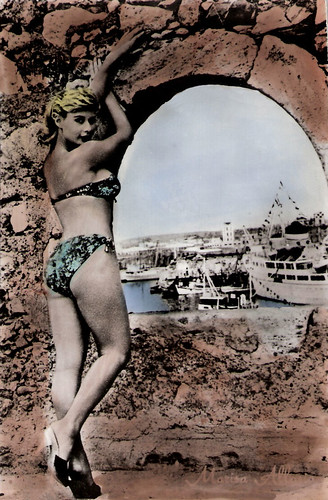
Yugoslavian postcard.
Yugoslavian postcard by Studio Sombor, no. 213.
Yugoslavian postcard by Studio Sombor, no. 300.
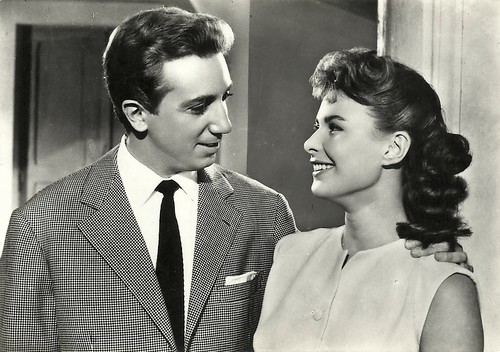
Italian postcard. Publicity still for Ragazze d'oggi/Girls of Today (Luigi Zampa, 1955) with Mike Bongiorno.
With Maurizio Arena. East-German postcard by VEB Progress Film-Vertrieb, Berlin, no. 1355, 1960. Retail price: 0,20 DM. Photo: Progress.

East-German postcard by VEB Progress Film-Vertrieb, Berlin, no. 1356, 1961. Retail price: 0,20 DM. Photo: Progress. Publicity still for Poveri ma belli/Poor But Beautiful (Dino Risi, 1957) with Renato Salvatori and Maurizio Arena.
Bikini girl
Marisa Allasio had her breakthrough as Giovanna in the comedy Poveri ma belli/Poor But Beautiful (Dino Risi, 1956) opposite Renato Salvatori and Maurizio Arena and the sequel Belle ma povere/Poor Girl, Pretty Girl (Dino Risi, 1957). Her part wins her national notoriety when the Pope condemns posters advertising it as 'overly exciting.' The posters are seized by Italian police. Despite this scandal, she became popular as ‘la ragazza bella’, with her amazing curves clad in a bikini.
She appeared as the main attraction in comedies like Marisa la civetta/Marisa (Mauro Bolognini, 1957) again with Renato Salvatori, Camping (Franco Zeffirelli, 1957), Susanna tutta panna/Susanna, you whipped cream (Steno, 1957), and Venezia, la luna e tu/Venice, the Moon and You (Dino Risi, 1958) with Alberto Sordi.
As a pin-up, she became hugely popular. In 1957 she was on the cover of Modern Man Quarterly Fall 1957, and an international breakthrough seemed only a matter of time. She appeared in the German-Italian coproduction Nackt, wie Gott sie schuf/Naked Like God Created Her (Hans Schott-Schöbinger, 1958), and the American-Italian Mario Lanza vehicle Seven Hills of Rome (Roy Rowland, 1958). But that would be her final film.
In 1958 she married Conte Pierfrancesco Calvi. Her husband is the 7th count of Bèrgolo, Head of the Calvi di Bèrgolo Family, since 1977. His mother was a daughter of H.R.M. Vittorio Emanuele III, King of Italy, King of Albania and Emperor of Ethiopia, and H.R.H. Elena Petrovich-Njegosch, Princess of Montenegro. He was 27; she was 22. The private ceremony was attended by only two other persons. Both families were reported opposed to the marriage.
Today the count and his wife are still married and have two children, Carlo Georgio (1959), and Anda Federica a.k.a. Yolanda (1962). The Italian New Wave group Diaframma dedicated a song to her, called Marisa Allasio. It’s on their album '3 Volte Lacrime' (1986).
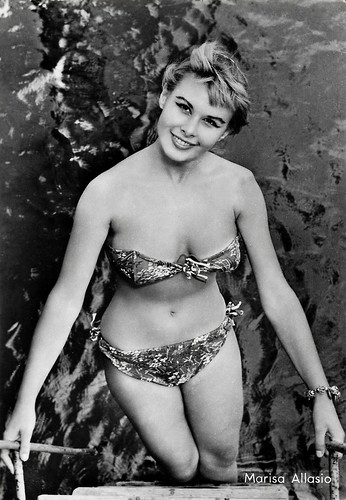
Italian postcard by Bromofoto, Milano, no. 153.

Italian postcard by Bromostampa, Milano, no. 166.

Italian postcard by Bromofoto, Milano, no. 224.
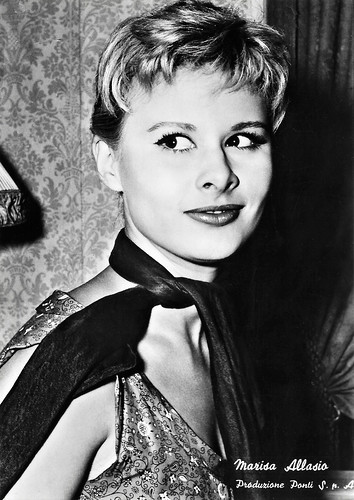
Italian postcard by Bromofoto, Milano, no. 1821. Photo: Produzione Ponti S.p.A.
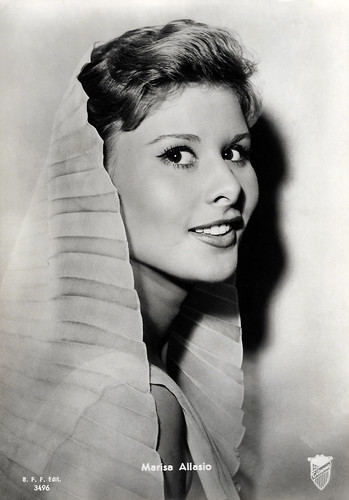
Italian postcard by B.F.F. Edit. (Casa Editr. Ballerini & Fratini, Firenze), no. 3496. Photo: Titanus / M.G.M. Marisa Allasio in Arrivederci Roma/Seven Hills of Rome (Roy Rowland, 1958).
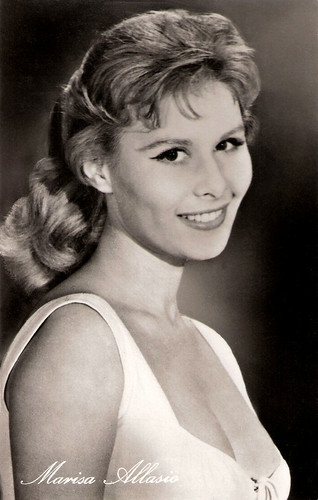
East-German postcard by VEB Progress Film-Vertrieb, Berlin, no. 1354, 1960. Retail price: 0,20 DM. Photo: Progress.
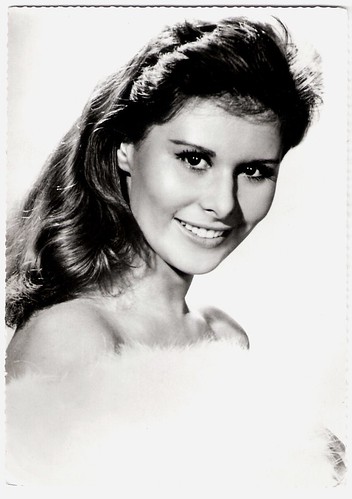
Yugoslavian postcard by 3K, no. 3918.
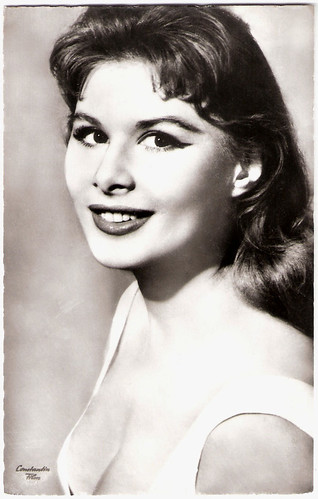
German postcard by Kolibri-Verlag G.m.b.H., Minden/Westf., no. 144. Photo: Titanus / Constantin.
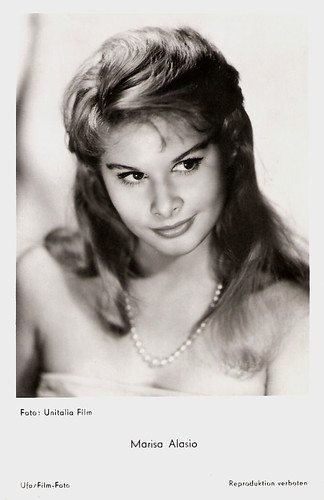
German postcard by Ufa, Berlin-Tempelhof, no. FK 4182. Photo: Unitalia Film.
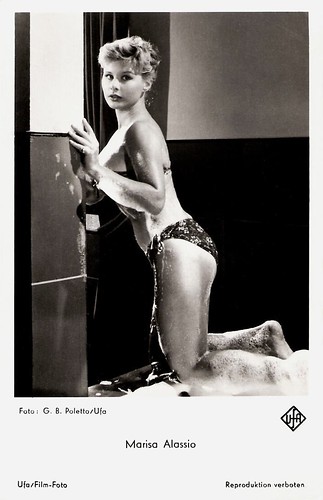
German postcard by Universum-Film Aktiengesellschaft (Ufa), Berlin-Tempelhof, no. PK 3914. Retail price: 25 Pfg. Photo: G. Poletto / Ufa. (The name of the actress is misspelt on the postcard).
Sources: Glamour Girls of the Silver Screen, Wikipedia (Italian) and IMDb.
No comments:
Post a Comment